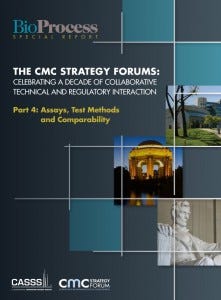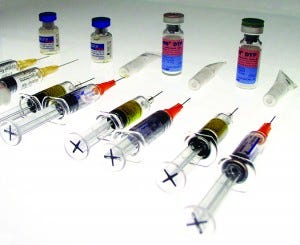Special Report on Assays, Test Methods, and Comparability: The CMC Strategy Forum Series, Part 4, IntroductionSpecial Report on Assays, Test Methods, and Comparability: The CMC Strategy Forum Series, Part 4, Introduction
November 17, 2015

The CMC Strategy Forums focus on relevant chemistry, manufacturing, and controls (CMC) issues throughout the life cycle of a therapeutic and thereby foster collaborative technical and regulatory interaction. Forum chairs share information with regulatory agencies to help them merge good scientific and regulatory practices. Outcomes of the forum meetings are published in BioProcess International and on the CASSS website (www.casss.org). This process is meant to help ensure that biopharmaceutical products manufactured with advancing technologies in a regulated environment will continue to be safe and efficacious.
This special report series highlights five general subject areas that have been covered in the first 10 years of the CMC Strategy Forum series: quality by design (QbD) and risk management; manufacturing strategies; analysis and characterization; assays, biosimilars, and comparability; and process- and product-related impurities. Appearing quarterly throughout 2015 and 2016, these topics will be represented by reprinted reports from one or more forum meetings along with additional information.
Please note that older documents may be superseded by more recent regulatory guidelines, but we believe that the view of how some of those concepts and practices have evolved is valuable in and of itself. Readers should keep in mind that some listed links may be nonfunctional, especially for older references; a search engine is always helpful in such cases. Also, in the interest of accuracy, the authors are listed with their affiliations at the time the papers were originally printed.
Product and Process Analysis
The importance of analytical methods to the QbD paradigm cannot be understated. They are essential to characterizing biological drug substances and developing final drug products, to quality assurance and control (QA/QC), to environmental monitoring, and assessment of raw materials and comparability. Modern analytical technologies are in fact what led us into the era of “well-characterized biotechnology products” and thus inevitably “follow-on biologics” or biosimilars. This insert focuses on test methods and product characterization, especially biosimilars (1) and the relationship between quality and higher-order protein structure (2).

WWW.SXC.COM
For 2016, we will take a different approach to this series with four expanded reports on process- and product-related impurities. CMC Forum discussions of extractables and leachables, product profiles, mycoplasma testing, and aggregates and particles will be complemented by new interviews on those topics with some of the original authors.
Our thanks go out to Karen Bertani of CASSS (www.casss.org), an international separation science society, as well as the forum series program committee (below), for trusting BPI as the publishing partner in this endeavor.
North American Program Committee |
|---|
Siddharth Advant (Kemwell Biopharma); Yves Aubin (Health Canada); John Bishop (FDA–CBER); Barry Cherney and Anthony Mire-Sluis (Amgen); JR Dobbins (Eli Lilly and Company); Julia Edwards (Biogen); Sarah Kennett (FDA–CDER); Joseph Kutza and Timothy Schofield (MedImmune–AstraZeneca); Kimberly May (Merck); StefaniePluschkell (Pfizer); Nadine Ritter (Global Biotech Experts); Reb Russell (Bristol-Myers Squibb); Oscar Salas-Solano (Seattle Genetics); Dieter Schmalzing (Genentech–Roche); Zahra Shahrokh (STC Biologics and ZDev Consulting); JeffreyStaecker (BioPhia Consulting); and Andrew Weiskopf (Biogen Idec) |
References
1 Ridgway A, et al. Biosimilar Products: Scientific Principles, Challenges, and Opportunities. BioProcess Int. 11(10) 2013.
2 Wei Z, et al. The Role of Higher-Order Structure in Defining Biopharmaceutical Quality. BioProcess Int. 9(4) 2011.
Cheryl Scott is cofounder and senior technical editor of BioProcess International, [email protected].
You May Also Like






